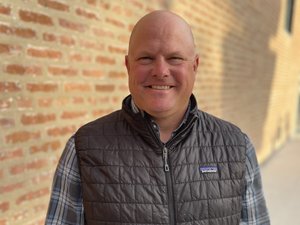
As a child, Joel Pollick grew up watching his dad run The Giving Back Fund, but he didn't want to follow in his father's philanthropic footsteps until after he worked in strategy consulting. When he realized that he couldn't find a simple giving platform that provided both transparency and simple donations, he decided to create one.
"Growing up, not only did [my dad] have his organization, but we also gave 10 percent of our income each year to charity," Pollick said. "I was working a lot of hours, so I didn't have a lot of hours to go research and vet different charities ... The more we looked, the more we couldn't find anything. And so, I said, 'Okay, let's build it.'"
So, he founded Percent Pledge, an 1871-based online charitable giving startup that aims to provide greater nonprofit transparency and automate charitable giving. Launched on Giving Tuesday, Nov. 28, 2017, the web-based platform has shifted from attracting millennial consumers to targeting their employers who want to retain young workers. This week, the web-based platform partnered with Spikeball, the Chicago-based sporting company that appeared on "Shark Tank," to pilot the platform for its 23 full-time employees.
"We wanted to test it out as a way to make it easier for our employees to give back," Spikeball CEO Chris Ruder said in an email. "We're firm believers in helping those that need help and we see this as a potential way to support that."
Much like the investment app Acorns, which matches stock portfolios to investors based upon their risk tolerance, Percent Pledge pairs donors with charitable giving portfolios filled with various nonprofits that serve causes like women's empowerment, healthcare and veterans. Users can enter their budget or salary information and determine how much money they prefer to give to these charities every month. Donors can choose weekly or monthly reports that update them on the progress of the charities to which they have donated, said Pollick.
Since the platform launched last fall, it has brought on more than 70 users who send a total $1,500 in monthly donations, Pollick said. The company lists several notable nonprofits as part of its charity portfolios including City Year, Team Rubicon, and Red Rover. Before adding a charity to its cause portfolios, Percent Pledge considers various factors including the percentage of donations that go directly to the needy and the amount of exposure or help the nonprofit needs.
Percent Pledge shifted to a business-to-business model to both bring more users onto the platform and assist companies seeking a more organized corporate giving program, as well as another way to attract and retain millennial workers. To make the site easier to use and welcoming to younger donors, the site signs up users in approximately 3 minutes and the language on the site is more conversational.
"For millennials, the main things keeping them from giving at the level they can isn't that they don't have that desire or that drive, it is not knowing where to begin. These cause portfolios really curate this for them," Eric Zoberman, Percent Pledge's president, said. "Ultimately, the idea is that we'll be able to give companies engagement opportunities as well."
Small- and mid-sized companies ranging between about 50 to 500 employees can now white label the Percent Pledge platform to simplify their corporate giving for their employees, meaning that employees can donate through the Percent Pledge platform but customize the platform with the company's logo and branding, Pollick said.
Percent Pledge currently keeps approximately 5 percent of all of the funds donated through the platform to cover the platform's transaction processing fees and service fees. While that's enough to "keep the lights on," Pollick says the startups is mulling over charging a licensing fee to companies looking to white label the platform or charging companies based on a tiered pricing model based on the number of employees using the site. For now, the companies can pilot the platform for free.
"We're here to help individuals make giving not something ... that happens by chance," Pollick said. "The point of the platform is to empower young professionals and their employers to make giving a big part of their lives."








